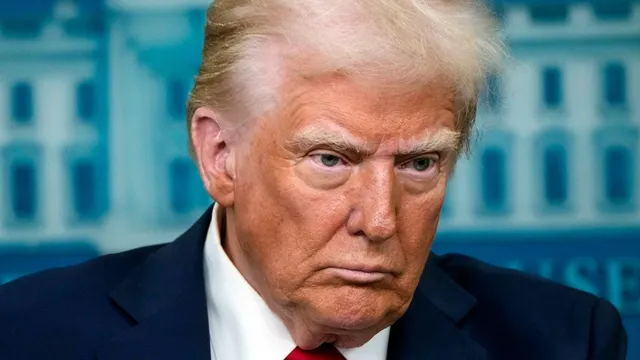
Trump halts critical foreign aid amid humanitarian crisis
2025-02-03 20:06- President Trump issued a 90-day freeze on U.S. foreign aid starting on January 20, 2025, sparking unrest among international aid organizations.
- The halt in funding affects crucial programs like the President's Emergency Plan for AIDS Relief, which supports millions needing life-saving HIV treatment.
- The long-term consequences could reverse decades of progress in health initiatives, increasing the risk of HIV spreading and undermining U.S. global leadership.
Express your sentiment!
Insights
On January 20, 2025, President Donald Trump issued a sweeping executive order effectively freezing nearly all foreign aid for a duration of 90 days. This decision, resulting from the administration's desire to ensure that aid distribution aligns with Trump's foreign policy, halted U.S. support for various international humanitarian efforts. The freeze raised significant concerns among health experts and aid agencies regarding the future of life-saving programs, especially those targeting HIV treatment in nations dependent on the President's Emergency Plan for AIDS Relief (PEPFAR), which has been essential in treating millions since its inception in 2003. Under the order, not only were new projects halted, but existing operations faced immediate stoppages, creating chaos within organizations reliant on U.S. assistance. Many contractors were instructed to cease their work immediately, leading to uncertainty around which programs would be exempt from the freeze despite Secretary of State Marco Rubio declaring some humanitarian assistance as exempt. The explicit omission of programs like PEPFAR from the waiver raised alarms, sparking fears that tens of millions of individuals, including children, could lose access to vital treatments. Experts warned that discontinuation or interruption of HIV treatments could reverse years of progress in combatting the virus, potentially leading to a spike in new infections and deaths reminiscent of the crisis of the 1980s. Various leaders in health and humanitarian sectors voiced their concerns, dubbing the decision a “death sentence” for many patients who depend on continuous access to HIV medications. The implications of these aid freezes ripple through global health efforts, leaving communities vulnerable and increasing the risk of HIV spreading unchecked. The move has broader implications for U.S. diplomatic relations and global humanitarian efforts. Observers argue that such actions undermine the United States' position as a leader in global health initiatives, allowing other nations such as China to fill the emerging power vacuums created by reduced American aid. The immediate effect of the freeze not only impacts health outcomes but also raises serious questions about the sustainability of international cooperative efforts in addressing global health challenges and humanitarian needs. As aid agencies grapple with the unintended consequences of halted funding, there is a pressing call for clarification regarding the President's directives and the future of humanitarian assistance provided by the U.S.
Contexts
The consequences of cuts to U.S. foreign aid are profound and multifaceted, impacting not only the recipient countries but also the U.S. itself and the global community. Foreign aid serves as a crucial mechanism for the U.S. to exert soft power, foster economic development, and promote stability in various regions. When aid is reduced or eliminated, the immediate effects often include increased poverty, greater instability, and heightened conflict in recipient countries. This can lead to worsening humanitarian crises, as governments struggle to provide basic services such as healthcare, education, and infrastructure. The withdrawal of U.S. support can also undermine democratic institutions, enabling authoritarian regimes to tighten their grip on power without the necessary checks that foreign assistance can help enforce. Additionally, countries that once relied on U.S. aid may turn to alternative partners, potentially aligning with rival powers, which could further erode U.S. influence on the global stage and impact strategic interests. Moreover, the domestic repercussions of cutting foreign aid can be significant. Public health threats, such as pandemics, do not confine themselves to borders; cuts in aid can reduce the capacity of countries to respond to health crises, increasing the risk of outbreaks that could affect U.S. citizens. Economic downturns in developing nations can lead to increased migration pressures as individuals seek better opportunities abroad, often resulting in national security concerns for the U.S. The interconnectedness of today's global economy means that instability abroad can quickly translate into economic volatility at home. By investing in foreign aid, the U.S. can help to cultivate stable environments that contribute to global economic growth, thereby benefiting its own economy in the long run. However, the efficacy and allocation of foreign aid are also subjects of intense debate. Critics argue that aid can create dependency rather than self-sufficiency, leading to ineffective use of resources. Ensuring that aid reaches those who truly need it and is utilized efficiently to foster sustainable development is essential. Transparency and accountability in aid distribution can mitigate some of these concerns, allowing for better evaluation of outcomes and adjustments to aid strategies over time. It is crucial for policymakers to explore innovative approaches to foreign aid that prioritize building local capacities, supporting economic development, and fostering resilience against future shocks. In conclusion, while there are valid concerns regarding the impact of U.S. foreign aid, cuts can have dire consequences for both the recipients and the U.S. itself. A comprehensive understanding of the complex interplay between foreign aid, global stability, and U.S. interests is necessary to navigate the future of U.S. foreign policy. As global issues continue to evolve, so too must the strategies employed in delivering foreign aid, ensuring that it remains a tool for diplomatic engagement, economic development, and global stability.